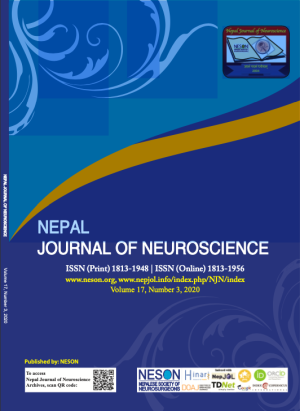Clinical Profile of Ocular Motor Nerve Palsies in Eastern Nepal
DOI:
https://doi.org/10.3126/njn.v17i3.33120Keywords:
Nepal, Nerve palsy, Ocular motor nerves, RetrospectiveAbstract
Introduction: To evaluate the trends of acquired ocular motor nerve palsy in an eye care centre without a dedicated neuro-ophthalmology setup based in Eastern region of Nepal.
Methods and Materials: A retrospective, cross-sectional study was conducted after reviewing the medical records of all the patients with newly diagnosed acquired ocular motor nerve palsy. All the patients underwent comprehensive ocular examination by general ophthalmologist and detailed orthoptics evaluation by an optometrist. Necessary blood investigations were obtained and neuro-imaging were ordered as appropriate. Neurology and otorhinolaryngology consultation were advised in indispensable cases.
Results: A total of 167 patients were included in this profile. Sixth cranial nerve was found to be the most commonly affected ocular motor nerve followed by third, fourth and combined ocular motor nerves respectively. Males were predominantly affected with male: female ratio of 2.63:1. The overall mean age of the patients was 45 ± 15.33 (15 to 82) years. Diplopia was the major complaint for presentation. The etiology was undetermined in 68/167 (40.7%) cases whereas among the identifiable causes; vascular etiology accounted for 58/167 (34.7%) cases followed by trauma in 22/167 (13.2%) cases.
Conclusion: The trends in distribution and etiology of ocular motor nerve palsies can be constant even though separated by geographical location. Ocular motor nerve palsy should be examined and diagnosed properly in collaboration with other specialists where there is lack of sophisticated complementary investigations. Multi-disciplinary approach is recommended which may compensate for the missed diagnosis and indeterminate aetiologies.




